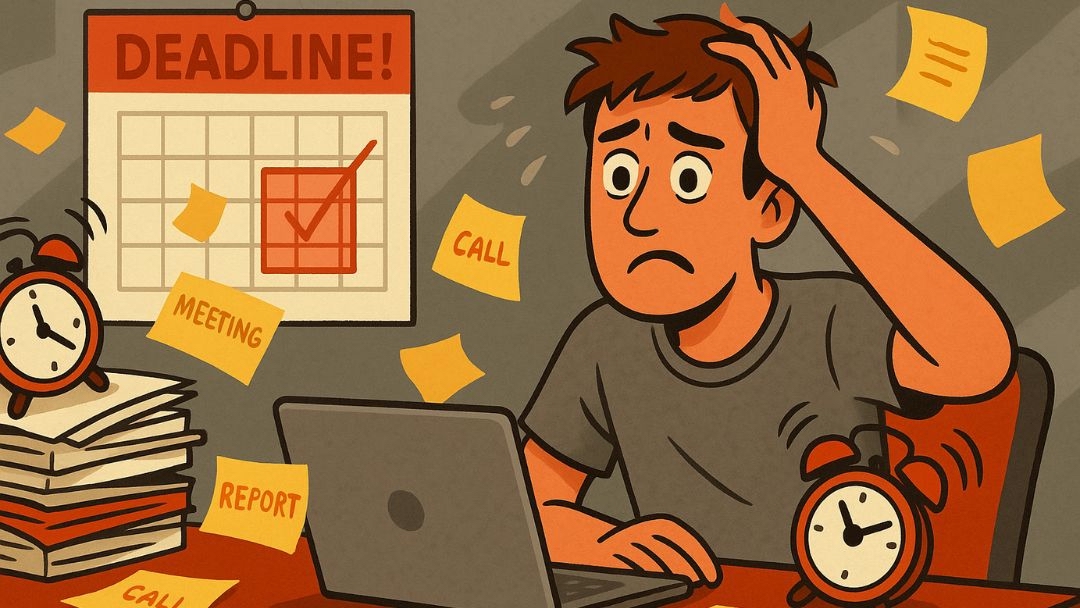How Low Conscientiousness Impacts Entrepreneurial Style
Some entrepreneurs succeed by following structure, while others move fast and adapt on the fly. Here, we examine how low Conscientiousness plays into that approach, shaping a business style driven more by instinct than by planning.


Back
7 mins read
Conscientiousness, one of the Big Five Personality traits, involves having strong organizational skills, being dependable, hardworking, and striving for long-term goals. Those with high conscientiousness tend to be proactive planners, thorough in their work, and reliable when following through on tasks or commitments.
Conversely, those with low scores often find themselves disorganized, careless, and unable to effectively manage time, resulting in incomplete tasks or forgotten obligations. Overall, in the context of entrepreneurship, this trait relates to self-control and discipline that ultimately allows individuals to meet business goals efficiently while upholding the standards of excellence.
People with low conscientiousness, also known as a Lack of Direction, are generally ill-suited for entrepreneurship. Their inability to set and achieve goals, be responsible, and be consistent could drastically hinder their entrepreneurial endeavors. For this reason, alternative career paths might be more suitable, such as being an employee or pursuing creative fields.
So, let's see how a lack of direction influences the entrepreneurial journey and its potential pros and cons in a business context.
You may also want to read:
- How Does High Conscientiousness Impact Entrepreneurial Style?
- How Does Moderate Conscientiousness Affect Entrepreneurial Style?
- Best Jobs and Careers for Conscientiousness Personality Traits
- Big 5 Conscientiousness vs. Lack of Direction: How Do These Traits Impact Learning Styles?
- Conscientiousness vs. Lack of Direction and Leadership Style: Strengths and Communication Styles
- Big 5 Conscientiousness vs. Lack of Direction Relationship Styles
How Does Low Conscientiousness Score Impact Entrepreneurial Style?
![]()
Entrepreneurs often possess high conscientiousness, linked to better organization, planning skills, and attention to detail. These characteristics are essential for dealing with various business tasks and challenges. Thus, those who don't have such strong traits may find it more difficult than their peers in the field. They might need to put in extra effort and collaborate with people who score higher on this trait to stay organized and focused.
An individual with a low conscientiousness score may approach life more spontaneously and flexibly, bringing creativity and innovation to entrepreneurship. However, it could also lead to disorganization, procrastination, or difficulty focusing on tasks.
A lack of direction might present problems with diligent planning, accurate task execution, and effective management. Plus, focusing on long-term goals for those scoring low on conscientiousness can be difficult. That is why people lacking direction often have poor motivation and may give up easily if their business goes differently than planned.
Tips for Achieving Success as an Entrepreneur with Low Conscientiousness

It can be challenging to succeed in business with low conscientiousness scores. However, we've got some advice that may help you make the most of your efforts and counterbalance any shortcomings related to lacking direction.
Create a Structure:
If you struggle with conscientiousness, create a structure that will help bring some order into your life. Take advantage of tools such as calendars, to-do lists, and reminders. These can assist in keeping yourself organized and managing tasks more effectively.
Break Tasks into Smaller, Manageable Pieces:
Breaking tasks into smaller chunks can make them much less intimidating and easier to manage. This approach can help you to stay motivated while focusing on long-term business goals.
Find an Accountability Partner:
Having someone to keep you accountable can be a major source of inspiration. It could be your buddy, relative, or co-worker. Having somebody who regularly monitors your progress is sure to help ensure that you stay on track.
Find Your Why
Reflecting on why you have set a particular goal can be an incredibly effective motivator. Invest some time to gain clarity and comprehend the deeper meaning behind your aspirations; this will ensure that you remain motivated, even when things get tough.
Use Affirmations:
Practicing positive affirmations can help to change your mindset and increase your self-confidence. Regularly repeating empowering phrases to yourself is an effective way of developing optimistic beliefs and encouraging productive actions.
While striving in business can be extremely challenging with low conscientiousness, you can increase your chances for success by implementing the right strategies. Remember, not everyone is supposed to become an entrepreneur. Some people can be more successful in other roles. It is better to be a top-notch professional than a mediocre entrepreneur.
Cons of Having Low Conscientiousness as an Entrepreneur

Entrepreneurs who lack direction may struggle in their professional endeavors. Moreover, people with low conscientiousness usually want to avoid becoming entrepreneurs. But if you decide to choose an entrepreneurial path, here are the challenges you can expect to encounter:
Difficulty in Meeting Deadlines:
Low conscientiousness can indicate a lack of discipline and orderliness, which in turn may lead to procrastination and excessive stress. This combination can prove disastrous in business since meeting deadlines is essential for success.
Poor Decision Making:
Not thinking things through carefully can lead to impulsivity and poor judgment, with potentially damaging consequences for the business. Being conscientious is necessary to avoid making choices without considering their potential impact.
Lack of Long-term Planning:
People with high conscientiousness tend to be highly adept at planning and organizing. On the other hand, those not as conscientious often fail to consider long-term goal setting. This lack of planning associated with low conscientiousness can decrease an organization's chances of survival.
Lack of Attention to Detail:
An eye for detail is key to succeeding in business, from ensuring quality standards to properly executing financial plans. Entrepreneurs who lack conscientiousness may miss out on important aspects of their venture, resulting in costly mistakes and oversights.
Impaired Problem-Solving Skills:
Conquering obstacles successfully is integral to the success of any business. Unfortunately, a lack of conscientiousness can impede one's ability to address issues efficiently, making it difficult for businesses to progress.
The lack of conscientiousness can be a major obstacle for entrepreneurs. It could disrupt their ability to manage deadlines, make decisions, and solve problems — all key to successful entrepreneurship. So, addressing the abovementioned issues will require extra hard work and diligence.
Famous Entrepreneurs with Low Conscientiousness
![]()
Amazingly, some people have risen above the challenges of low conscientiousness and become incredibly successful entrepreneurs. To illustrate, here are a few entrepreneurs who are known for their laid-back approach to business and other characteristics associated with low conscientiousness:
Stan Lee:
Stan Lee was a dreamer who lacked organization, yet his creativity and ability to captivate an audience enabled him to establish some of the most iconic characters in popular culture. Stan Lee's stories left their mark on entertainment history, from Spider-Man and Iron Man to the X-Men.
Andy Warhol:
Andy Warhol's eccentric and laid-back personality was a defining characteristic of his success as one of the twentieth century's most influential visual artists, entrepreneurs, and pop art movement leaders. His unique perspective on life and innovative approach to creating artwork made him a stand-out figure in modern-day culture.
Dan Bilzerian:
Widely referred to as the "King of Instagram," Dan Bilzerian is a notorious social media influencer, poker player, and entrepreneur. He's renowned for his extravagant lifestyle that includes grandiose displays of wealth, which might indicate a low conscientiousness trait.
Guy Laliberté:
Guy Laliberté, the co-founder of Cirque du Soleil, is renowned for his creative vision and propensity to take risks. His entrepreneurial style may be atypical compared to more traditional approaches. However, his capacity for imaginative thought combined with calculated risk-taking has proved essential in achieving success.
Felix Dennis:
Felix Dennis, the founder of Maxim magazine, was renowned for his maverick approach to business and willingness to take risks. While he wasn't always known for being responsible or dutiful in his work ethic, his creativity drove him toward success.
Tony Hawk:
Known for his laid-back personality and innovative approach to skateboarding, Tony Hawk has become a renowned professional skater and entrepreneur. Despite exhibiting traits of determination and a strong work ethic, his relaxed nature distinguishes him from the traditional idea of someone highly conscientious.
John McAfee:
John McAfee, founder of the renowned antivirus software, was a complex figure whose erratic and unconventional behavior made him an unpredictable force. Despite his pioneering work in creating one of the earliest commercial virus protection programs, he encountered numerous legal issues throughout his later years.
It's fascinating that most of the entrepreneurs on this list weren't necessarily looking to become business owners. Rather, luck and a few unanticipated events led them into entrepreneurship. However, it should also be noted that people with a low conscientiousness score can increase it by working long enough as entrepreneurs.
Low Conscientiousness Businesses and Industries

Individuals with a low conscientiousness score can thrive in chaotic, creative industries and businesses that are not primarily oriented toward making as much money as possible. These fields require flexibility and the ability to adjust to constant change, qualities that those who don't prioritize organization naturally possess.
Here are some businesses and industries potentially suitable for entrepreneurs with low conscientiousness.
Creative Businesses:
Creativity can come alive in an atmosphere that doesn't impose too many regulations and protocols. In fields such as advertising, design, music, and art, originality tends to be prioritized over adherence to strict guidelines or timetables. For those with lower levels of conscientiousness, such settings can be highly attractive.
Online Content Creation:
The online content creation realm, such as blogging, vlogging, and social media influencing, is always changing. To stay ahead of the curve, be agile with your approach to produce original content that will captivate an internet-based audience. You don’t necessarily need to work in a structured and organized manner to achieve success in this industry.
Recreation and Leisure:
Businesses in the recreation and leisure industry, like adventure sports, outdoor activities, or entertainment services, may be a great fit for entrepreneurs with low conscientiousness. Their spontaneous attitude and adventurous spirit can create unique experiences that their clients will enjoy.
Gaming and Entertainment:
The gaming and entertainment sector is an ever-evolving space that requires out-of-the-box, imaginative ideas. Those with a lower level of conscientiousness may still succeed when creating innovative games and applications or providing exceptional entertainment services.
Pop-up Shops:
For entrepreneurs with low conscientiousness, pop-up shops can be the perfect fit. They can adjust to new surroundings easily and swiftly decide what goods they should offer.
Food Truck Business:
Operating a food truck could be the perfect venture for entrepreneurs who don't plan ahead too much. Their natural knack for improvisation and their capacity to adapt to different environments quickly can set them up well to run a profitable business on wheels.
DJ Services:
Creating a successful DJ business involves the ability to read and adjust to the atmosphere of any event, picking tunes that will captivate your audience. Even those with low conscientiousness may make it big in this industry by crafting lively, unforgettable musical experiences for their audience.

Although low conscientiousness is usually associated with disorganization and an absence of self-control, it's essential to remember that this trait also comes with characteristics beneficial in specific contexts, like impulsivity, creativity, and the ability to entertain others.
When used wisely in entrepreneurial projects, these advantages can be leveraged, and you can succeed in life and business. Don't be afraid to fail, and don't let a traditional mindset hold you back from achieving something remarkable.


Return to Blog






